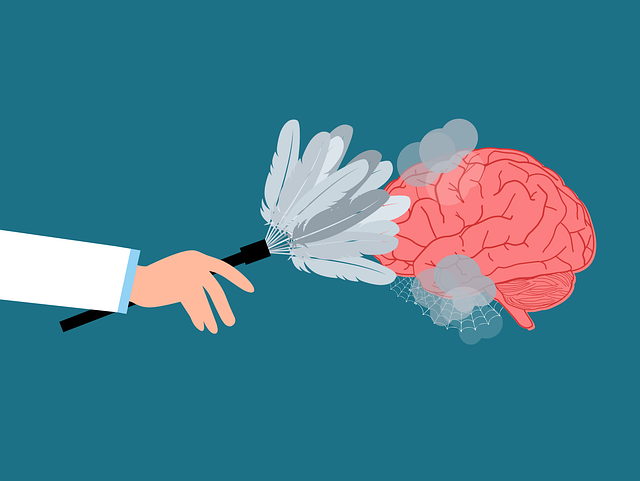Healthcare providers specializing in Boulder Autism Spectrum Disorder (ASD) therapy face unique challenges leading to high burnout rates due to long hours, high-stress situations, and intense emotional demands. Burnout negatively impacts patient care quality and increases turnover. Early recognition of symptoms like persistent fatigue, mood changes, and depersonalization is crucial for intervention. Strategies to prevent burnout include community outreach promoting work-life balance, stress management techniques, peer support networks, open dialogue about mental health, resources for prevention, and valuing healthcare providers. Mitigating risks through tailored interventions, continuous training, and inclusive environments ensures quality care for Boulder's ASD therapy community. Prioritizing self-care practices, mood management, and supportive environments further reduces stress and enhances well-being among professionals working with autistic individuals.
“Healthcare provider burnout is a pressing issue, especially among autism spectrum disorder (ASD) therapists in Boulder. This article delves into strategies to prevent professional exhaustion, focusing on understanding burnout’s intricacies and its unique risks within the ASD therapy community. We explore methods to enhance resilience, promote work-life balance, and integrate self-care practices tailored for therapists. Additionally, we highlight the significance of creating supportive environments, specifically addressing the needs of Boulder ASD therapy professionals, to foster a sustainable career.”
- Understanding Burnout Among Healthcare Providers
- Identifying Risk Factors for Burnout in ASD Therapists
- Strategies to Enhance Resilience and Work-Life Balance
- Integrating Self-Care Practices into Daily Routines
- Creating Supportive Environments for Boulder Autism Spectrum Disorder Therapy Professionals
Understanding Burnout Among Healthcare Providers

Healthcare providers, particularly those specializing in niche areas like Boulder Autism Spectrum Disorder Therapy, face unique challenges that can contribute to burnout. The demanding nature of their work, often involving long hours and high-stress situations, takes a toll on mental and emotional well-being over time. Burnout is not just fatigue; it’s a state of physical and emotional exhaustion characterized by cynicism and detachment from one’s job. In the case of healthcare professionals, this can lead to decreased patient care quality and increased turnover rates, impacting both individual practitioners and the broader healthcare system.
Recognizing burnout early is crucial for effective intervention. Signs may include persistent fatigue, changes in mood or appetite, and a sense of depersonalization. Implementing strategies like community outreach program initiatives that promote work-life balance, stress management through mood regulation techniques, and peer support networks can help prevent burnout. Additionally, organizations should encourage open dialogue about mental health, providing resources for burnout prevention and ensuring healthcare providers feel valued and supported in their crucial roles.
Identifying Risk Factors for Burnout in ASD Therapists

Burnout among Autism Spectrum Disorder (ASD) therapists is a growing concern in Boulder’s mental healthcare landscape. Several risk factors contribute to this issue, demanding tailored interventions. Therapists often face high caseloads and intense emotional demands when supporting individuals with ASD through complex challenges. The nature of their work requires extensive time and energy, leaving little room for self-care. This constant exposure to clients’ struggles can lead to emotional exhaustion and a sense of detachment.
Moreover, cultural sensitivity in mental healthcare practice is paramount. Therapists must navigate diverse backgrounds and unique communication styles, which can be particularly challenging with ASD populations. Lack of support systems or inadequate conflict resolution techniques may exacerbate these pressures. Boosting therapists’ confidence through continuous training and fostering an inclusive environment are essential strategies to mitigate burnout risks, ensuring sustained quality care for Boulder’s ASD therapy community.
Strategies to Enhance Resilience and Work-Life Balance

Healthcare providers, particularly those specializing in complex areas like Boulder Autism Spectrum Disorder Therapy, often face unique challenges that can lead to burnout. To mitigate this, fostering resilience and achieving a healthy work-life balance are paramount. Strategies such as regular self-care practices, including exercise, mindfulness, and adequate sleep, empower providers to recharge. Additionally, seeking Trauma Support Services and engaging in activities outside of work can help create boundaries and reduce stress levels.
Cultural Competency Training plays a crucial role in enhancing these efforts by equipping providers with the knowledge and skills to navigate diverse patient populations effectively. This not only improves job satisfaction but also strengthens relationships with patients. Incorporating Mood Management techniques, whether through therapy or counseling, further contributes to resilience by providing tools to cope with demanding situations. By implementing these holistic strategies, healthcare providers can build a robust foundation for long-term well-being.
Integrating Self-Care Practices into Daily Routines

In today’s demanding healthcare landscape, burnout prevention is paramount, especially for professionals working with individuals on the autism spectrum. Integrating self-care practices into daily routines is a powerful strategy to combat stress and promote resilience among providers in Boulder Autism Spectrum Disorder Therapy. By prioritizing personal well-being, therapists can enhance their ability to offer compassionate and effective support to their clients.
Compassion cultivation practices, such as mindfulness meditation and positive thinking exercises, have been shown to reduce burnout and improve overall mental health. Encouraging therapists to engage in regular self-care routines, including physical activity and adequate sleep, can help prevent depression and foster a sense of renewal. These strategies not only benefit the healthcare providers but also ensure they are equipped to offer the best possible care to individuals navigating autism spectrum disorders.
Creating Supportive Environments for Boulder Autism Spectrum Disorder Therapy Professionals

Creating supportive environments is an essential strategy to prevent burnout among professionals specializing in Boulder Autism Spectrum Disorder (ASD) therapy. These dedicated individuals often face high-stress situations, requiring tailored support systems within their workplaces. One effective approach is implementing comprehensive stress management programs that acknowledge and address the unique challenges they encounter. Such initiatives can include regular relaxation techniques, mindfulness workshops, or peer support groups to foster a sense of community and reduce isolation.
Additionally, integrating mental health education programs designed specifically for ASD professionals can empower them with valuable insights into managing their own well-being alongside supporting their clients. These programs might cover topics like self-care practices, emotional regulation strategies, and resilience-building techniques. Social skills training tailored to the professional’s needs can also be beneficial, fostering a supportive network that encourages open communication and collaboration, ultimately enhancing job satisfaction and reducing burnout risks.
Burnout among healthcare providers, particularly ASD therapists in the Boulder community, is a pressing issue that demands proactive strategies. By identifying risk factors and implementing resilience-building techniques, professionals can enhance their work-life balance. Integrating self-care practices into daily routines, as well as fostering supportive environments, are essential steps to prevent burnout. Adopting these measures ensures that Boulder Autism Spectrum Disorder Therapy professionals can continue to provide quality care while maintaining their well-being.














